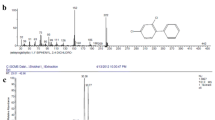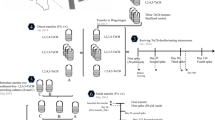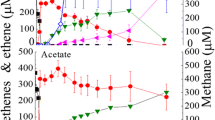Abstract
A methanogenic mixed culture enriched from Saale river sediment was able to transform all chlorobenzenes by reductive dechlorination via monochlorobenzene to unsubstituted benzene after a short lag phase of only 1 week. The formation of benzene was confirmed by GC/MS in pentane extracts of the sludge samples, as well as in the headspace gas of the batch cultures. The spectra of substrate utilization of the adapted cultures depended mainly on the substrates used for adaptation. Sediment microbes that had been adapted with a mixture of the three isomers of trichlorobenzene offered the widest spectrum for the utilization of chlorobenzenes in all chlorine stages. Reductive dechlorination was stimulated when the mixed cultures were supplemented with pyruvate and methanol.
Similar content being viewed by others
Author information
Authors and Affiliations
Additional information
Received: 17 July 1995/Received revision: 11 December 1995/Accepted: 18 December 1995
Rights and permissions
About this article
Cite this article
Nowak, J., Kirsch, N., Hegemann, W. et al. Total reductive dechlorination of chlorobenzenes to benzene by a methanogenic mixed culture enriched from Saale river sediment. Appl Microbiol Biotechnol 45, 700–709 (1996). https://doi.org/10.1007/s002530050751
Issue Date:
DOI: https://doi.org/10.1007/s002530050751




